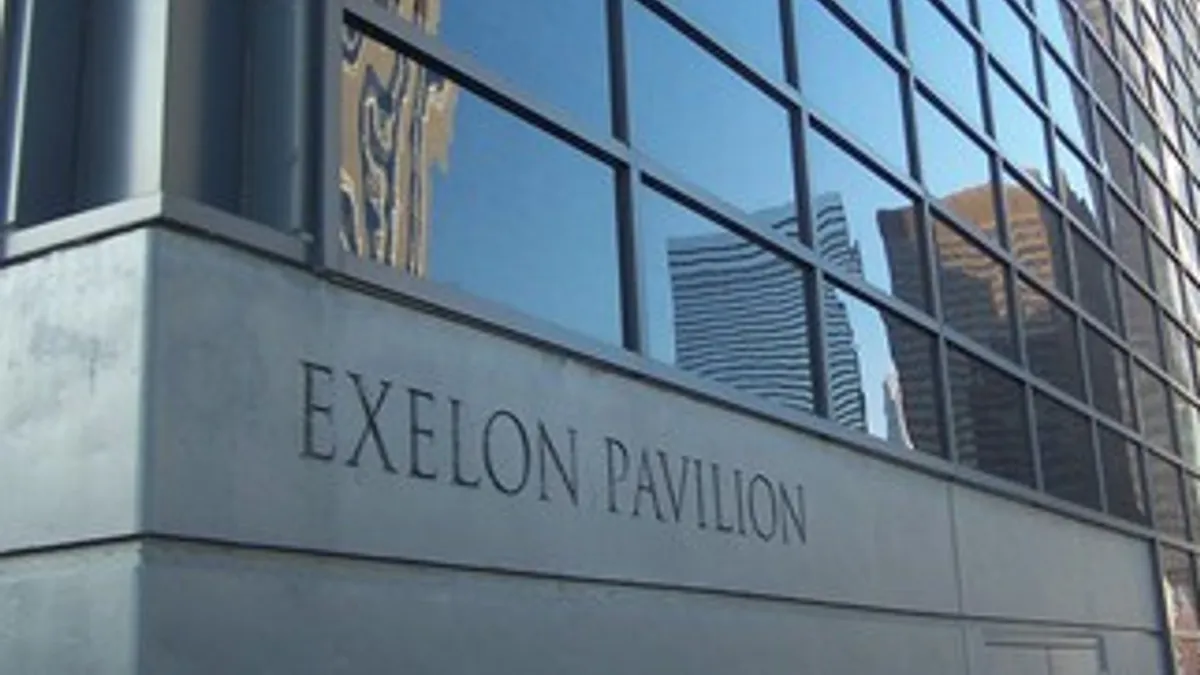Dive Brief:
- Exelon and Pepco will not walk away from their proposed $6.8 billion merger deal by a self-imposed March 4 deadline, the Washington Business Journal reports, but will continue work to respond to new merger conditions laid out by regulators.
- Last week, the D.C. Public Service Commission rejected a settlement deal struck by the companies, the mayor's office and other merger stakeholders, but outlined four new conditions for the deal that would result in automatic approval if adopted. D.C. Mayor Muriel Bowser, in a surprise move Tuesday, opposed the PSC order, saying it "guts much needed protections against rate increases for D.C. residents and assistance for low-income D.C. ratepayers."
- Without approval of the conditions by all settlement parties, the merger cannot be automatically approved, though Exelon and Pepco may offer new options for customer relief by a March 11 deadline set by regulators.
Dive Insight:
It's been one week since regulators in the District of Columbia met to vote on the Exelon-Pepco merger for a second time, and the outlook for the deal looks vastly different than it did last Friday.
On Feb. 26, D.C. regulators rejected a settlement deal brokered between the companies, the D.C. government and several merger stakeholders, saying it was not in the public interest as proposed. But they also laid out four new conditions on the deal they said would result in automatic approval if adopted by all the settlement parties.
The immediate expectation among merger-watchers was that the conditions would be adopted quickly, securing the acquisition after nearly two years of regulatory debates. But on Tuesday morning, People's Counsel Sandra Mattavous-Frye, the city's residential ratepayer advocate, announced her opposition to the new conditions, saying PSC order "eviscerates the benefits and protections essential to render the proposed merger in the public interest."
D.C. Mayor Muriel Bowser (D) issued her announcement against the new conditions that afternoon, and Attorney General Karl Racine (D) followed soon after. D.C. Water, the city's water utility, announced its opposition Thursday as well.
At issue is the allocation of $25.6 million that Exelon was set to earmark for residential customer rate relief under the settlement deal. In rejecting the merger, regulators expressed concern that non-residential customers were shut out of the benefits and issued the condition that the funds should be allocated as a part of Pepco's net rate case proceeding, which the PSC oversees. D.C. officials targeted that condition in their statements against the PSC order.
The opposition of key settlement parties to the new conditions puts the merger deal in doubt, but the companies say they will fight on. On Thursday Exelon told the Washington Business Journal that it would continue to work toward a deal that could satisfy regulators and the city. Earlier in the year, the companies had threatened to walk from the deal by March 4 if it did not have PSC approval by then.
The financial stakes in the proceeding are high for Exelon, which is seeking the predictable income of Pepco's utility business to hedge against risks from a generation fleet that includes many older nuclear plants running on the verge of being unprofitable in PJM markets.
In 2014, Crain's reported that Exelon CEO Chris Crane told analysts the company could finance its entire dividend for shareholders with its regulated businesses if the Pepco merger were approved — no small benefit for a company that cut its dividend 41% the year before.
On Thursday, Guggenheim Securities analyst Shahriar Pourreza told RTO Insider it "questionable" whether the company could support a dividend at all without the deal.
“It’s pretty mind-boggling, the games that these regulators are playing," Pourreza told the news outlet. "The argument that the commission brought on Friday is very workable. I sort of question whether the commission did this because they knew that the settling parties wouldn’t go for this.”
In their Feb. 26 order, regulators gave settlement parties until March 11 to respond to the new conditions, and the companies have the option of offering new customer benefits and incentives in that filing. Stakeholders will have seven days from that deadline to respond.
Approval from D.C. regulators is the final hurdle for the deal to clear before closing. Federal regulators, as well as those in Maryland, Virginia, Delaware and New Jersey, have already cleared the merger.
For more information on the deal, check out our feature on the PSC decision and this timeline on the merger saga.













